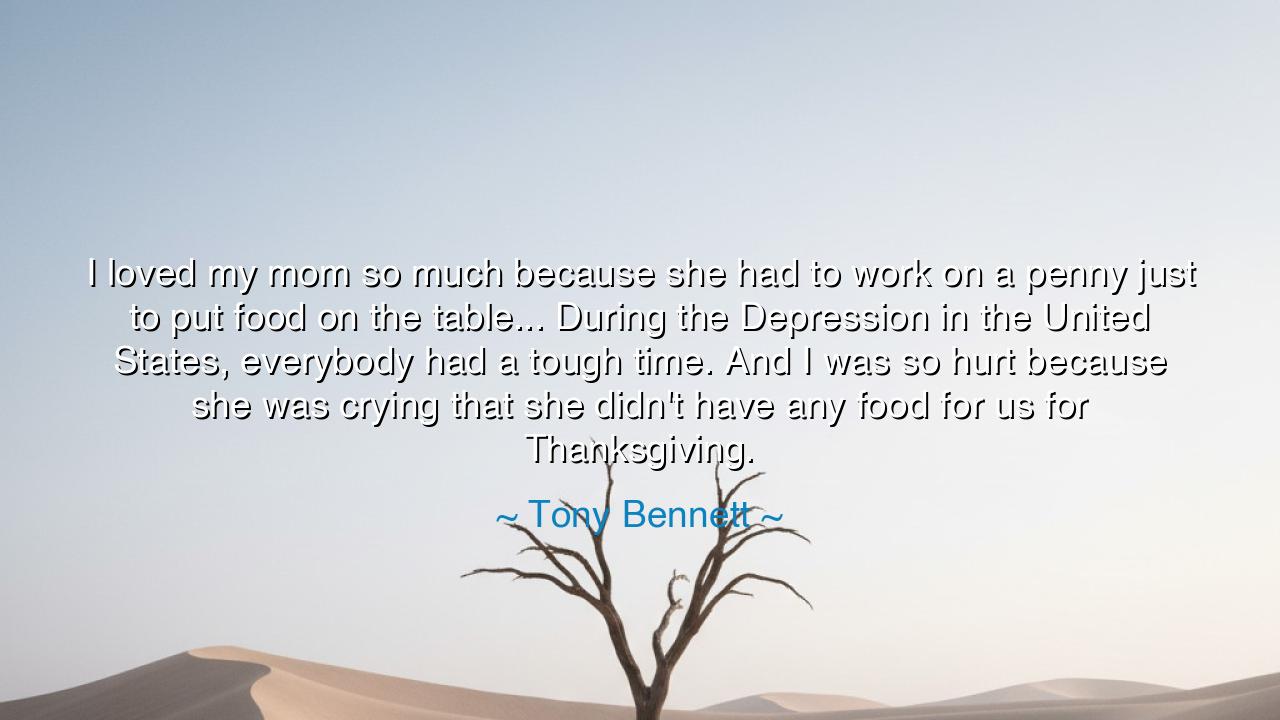
I loved my mom so much because she had to work on a penny just
I loved my mom so much because she had to work on a penny just to put food on the table... During the Depression in the United States, everybody had a tough time. And I was so hurt because she was crying that she didn't have any food for us for Thanksgiving.






Tony Bennett, the voice of velvet and sorrow, once remembered with deep tenderness: “I loved my mom so much because she had to work on a penny just to put food on the table... During the Depression in the United States, everybody had a tough time. And I was so hurt because she was crying that she didn’t have any food for us for Thanksgiving.” These words, though born from pain, are filled with reverence. They reveal a son’s undying gratitude for a mother’s sacrifice, and a timeless truth: that the truest strength is often carried by those who labor in silence, unseen by the world but essential to the survival of their children.
The origin of this saying rests in Bennett’s childhood in Astoria, Queens, during the dark years of the Great Depression. Like millions of families, his endured hunger, uncertainty, and the daily struggle for survival. His father had died when he was young, leaving his mother, Anna, to support the family with her skill as a seamstress. She worked endlessly, often for little pay, stretching every coin to feed her children. Yet even her tireless effort could not shield them completely, and there were days when the table lay bare. One such day fell on Thanksgiving, the day meant for abundance and gratitude. Seeing his mother weep at her inability to provide left an indelible scar upon young Tony’s heart, shaping both his empathy and his reverence for her.
This story echoes countless others from history. In times of famine and war, it has always been the unseen labor of mothers and fathers that kept families alive. Consider the Irish Potato Famine of the 19th century, when women sold their last possessions or walked miles barefoot to find scraps for their children. Or the Dust Bowl families of the American plains, who endured storms of earth and skies of fire, yet pressed on with hope. These were not grand acts sung by poets at the time, but quiet heroism born of necessity. Like Bennett’s mother, they bore the suffering of generations, often with tears, but always with love.
The mention of Thanksgiving in Bennett’s memory makes the moment even more poignant. For this holiday, consecrated to gratitude, becomes especially painful when there is nothing to share at the table. Yet paradoxically, it also deepens the meaning of gratitude itself. When food is scarce, one learns that thanksgiving is not merely about abundance, but about survival, about love, about the unseen sacrifices of those who labor for us. The tears of Bennett’s mother were not only of sorrow, but of devotion—for her pain came not from her own hunger, but from her children’s.
From this story we learn that the greatness of parents often lies not in what they can give, but in what they endure for their children. Bennett’s reverence for his mother—“I loved my mom so much”—sprang not from riches or feasts, but from the memory of her fighting despair with dignity. It was this hardship, paradoxically, that instilled in him the compassion and humility that would later define his music and his life. His art carried not only melody, but the soul of one who had witnessed sacrifice and learned to honor it.
The lesson here is eternal: never take for granted the sacrifices made on your behalf. Gratitude is not only for the feast-laden table, but also for the tears shed in kitchens when the cupboards are bare, for the endless labors of parents who stretch coins into meals, for the quiet acts of love that sustain life when the world is harsh. To honor these sacrifices is to carry them forward in our own lives, with compassion for others and humility in our blessings.
So, O listener, take Bennett’s words to heart. When you sit at your Thanksgiving table, laden or humble, remember those who have wept so that you could eat. If your parents sacrificed, honor them. If others around you now struggle, extend your hand. For gratitude is not complete when it is spoken only for ourselves—it must become action for others. In this way, the tears of the past are not forgotten, but transformed into rivers of love that flow into the future. And thus, the spirit of Bennett’s mother lives on—not only in her son’s music, but in every heart that chooses to remember and give thanks.






AAdministratorAdministrator
Welcome, honored guests. Please leave a comment, we will respond soon